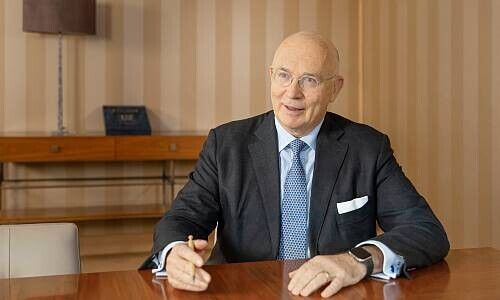J. Safra Sarasin: «We Cannot Predict the Future Course of Sanctions»
J. Safra Sarasin's Chairman tells finews.asia that Switzerland is the best location for private banking as it is a safe haven for overseas clients.
Joerg Haller - J. Safra Sarasin profited from the excellent conditions for wealth management in 2021. But now things have become more difficult in many respects. Is that also your view?
There are a number of positives, among them that consumers and industry have learned to live with COVID-19 while China has not lost much steam as the world's growth driver. On the other hand, some central banks have been surprised by the rapid increase in inflation and are looking to raise interest rates. In the meantime, we have geopolitical tensions in the Ukraine and Russia. This will have consequences for the financial markets and the real economy.
Russia has been impacted by a wave of sanctions. How does that affect your bank?
We cannot predict the future course of sanctions and much of it depends on how the situation changes. What we can say is that we will follow the instructions of the Swiss government and the authorities. We are also currently pursuing an investment policy that reflects heightened geopolitical risks.
A number of private banks had to revalue positions of Russian securities in client portfolios after their significant decline. Did this also happen with J. Safra Sarasin – and did you have to make any margin calls?
Were there any such positions, then revaluing them would have been a normal process. We would like to refrain from commenting on individual circumstances.
How important is the Eastern European business for the bank?
Switzerland is still the best location worldwide for private banking. Political stability, the legal framework and a strong currency make the country appear as a safe haven.
«We continue to see ourselves as a consolidator in global private banking»
Our Russian clients see it the same way and we continue to work with them if they fulfill our compliance requirements. We are also fortunate with our broad geographic spread. We have no predominant region outside of the concentration in the Swiss business, which is due to our history.
New money growth was notable when looking at last year's performance. Where are the assets coming from?
The new money is coming from new clients, and existing ones who are trusting us with additional assets. The growth in institutional clients was particularly pleasing and it reflects our fund expertise and extensive experience with sustainable assets. Growth in private banking was also strong and all regions contributed to it.
Profits grew as well. Is the Safra family requesting a dividend this time?
It has been the bank's policy to keep annual profits and reinvest them in the business until now. The family see it the same way, and it is their intent to keep the bank as strong as possible so that it can operate in difficult economic circumstances.
You can also use earnings for acquisitions. J. Safra Sarasin is a known consolidator. Will anyone be taken over in 2022?
We continue to see ourselves as a consolidator in global private banking. Acquisitions in all regions are possible from that perspective.
Are there any Swiss targets left for a private bank your size?
Swiss banks are no different than others when it comes to evaluating potential acquisitions. They need to make business sense and the teams and clients should fit our culture.
The rapid escalation in Ukraine could put acquisitions on the back burner. What is your scenario for the conflict?
The environment is not as good as it was in the past few months. Experience tends to indicate that regional conflicts only have a short-term impact on financial markets.
«The long-term perspective of the Safra family is also a support»
But central banks might need to change monetary policy and add liquidity as a result of the situation in Ukraine.
Would that impact J. Safra Sarasin's business?
I am confident that we will continue to deliver stable earnings given the group's solid position and disciplined business. The long-term perspective of the Safra family is also a support.
And the next generation of J. Safra Sarasin shareholders?
We all admire and are thankful for the work of our founder Joseph Safra. His son Jacob Safra is an experienced banker and guides the group with the same values and principles.
Jürg Haller has been chairman of Bank J. Safra Sarasin since 2019. Previous to that, he held different management positions at UBS (originally Swiss Bank Corp/SBC), where he was employed from 1984 onwards. His last position at the bank was as executive vice chairman of global wealth management (GWM). The institute Haller chair belongs to the Brazilian J. Safra group. In 2021, it recorded a profit of roughly $460 million and $244 billion in assets under management while employing 2,300 staff.


























